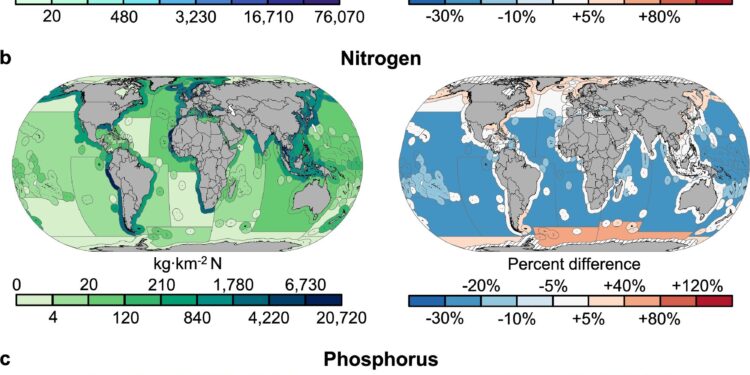Spatial distribution of total nutrient extractions between 1960 and 2018 in exclusive economic areas and high -sea regions. Credit: Earth & Environment Communications (2025). DOI: 10.1038 / S43247-025-02218-Z
The four billion tonnes of marine organizations that world fisheries extracted from the ocean between 1960 and 2018 led to exhaustion of more than 560 million tonnes of essential nutrients for the health of the ecosystem, has revealed new research.
In a recent article published in the journal Earth & Environment CommunicationsResearchers at Utah State University and the Sea Around US Initiative from the University of British Columbia estimate that industrial peaches have abolished more than 430 million tonnes of carbon, 110 million tonnes of nitrogen and 23 million tonnes of phosphorus of the exclusive economic zones of countries and 18 high sea regions since 1960.
“Pisces and other marine organizations contain specific nutrients in their bodies. By massively targeting 330 species based on consumer demand, socio -political factors and natural availability, industrial peaches have changed the natural balance of nutrients from marine ecosystems,” said Adrian Gonzalez Ortiz, which led to research Utah State University.
“In other words, the natural flow of nutrients between the different levels of the food network has undoubtedly been modified. Knowing that this is important because the productivity of the oceans is strongly based on effective recycling of nutrients.”
Over the past 60 years, most of the ocean nutrients’ extraction has occurred thanks to the fishing of medium -sized predators such as herring and mackerel – which are both hunters and prey and store high proportions of carbon, nitrogen and phosphorus. These were followed by high-level predators such as tuna and fellow fish, and to a lesser extent, by fish in the lower levels of the food chain such as sardines and parrot.
“On average, highly targeted predatory species store higher proportions of carbon, nitrogen and phosphorus, compared to other trophic groups,” said Dr. Trisha B. Atwood, co-author of the study and associate professor at the State University of UTA.
“The disproportionate elimination of medium -sized predators can decrease the pool of biomass rich in ecosystem nutrients and reduce the availability of nutrients rich for higher level predators.
Total nutrient extractions by trophic group over periods. Credit: Earth & Environment Communications (2025). DOI: 10.1038 / S43247-025-02218-Z
In terms of geography, most of the nutrient extraction occurred in highly productive regions in the exclusive economic areas of countries (EEZ), intermediate level predators being the main target and the highest levels of nutrient loss found in Cambodian Eez.
“Although the overfishing led to maximum catches in the 1990s, the later decline allowed the extraction of nutrients to decrease in 160 regions by the 2010s,” said Dr. Maria “Deng” Palomares, co-author of The Paper and Manager of the Sea AROUND US Initiative.
“Such a decrease in captures has led to the expansion of peaches to other oceanic areas, some of them not previously not. This expansion has increased nutrient extractions in recent years in such areas, especially in tropical and subtropical regions of the Pacific and High Sea.”
Unlike other studies that have estimated nutrients’ extraction using standardized nutritional composition values, this study used specific measurements for the carbon, nitrogen and phosphorus of 330 species targeted by fishing.
“This approach helped us explain the major differences in nutrient content among the various marine organizations targeted by fisheries,” said Gonzalez Ortiz. “Previous studies have often ignored these specificities, but take them into account the follow -up of changes in space and time, and have a more precise understanding of the impact of the loss of these ocean nutrients.”
More information:
Adrián A. González Ortiz et al, the peaches disrupt marine nutritious cycles by extraction of biomass, Earth & Environment Communications (2025). DOI: 10.1038 / S43247-025-02218-Z
Supplied by the sea around us
Quote: The extraction of world fishing nutrients threatens ecosystems and productivity of the ocean, the results of the study (2025, April 10) recovered on April 11, 2025 from
This document is subject to copyright. In addition to any fair program for private or research purposes, no part can be reproduced without written authorization. The content is provided only for information purposes.



